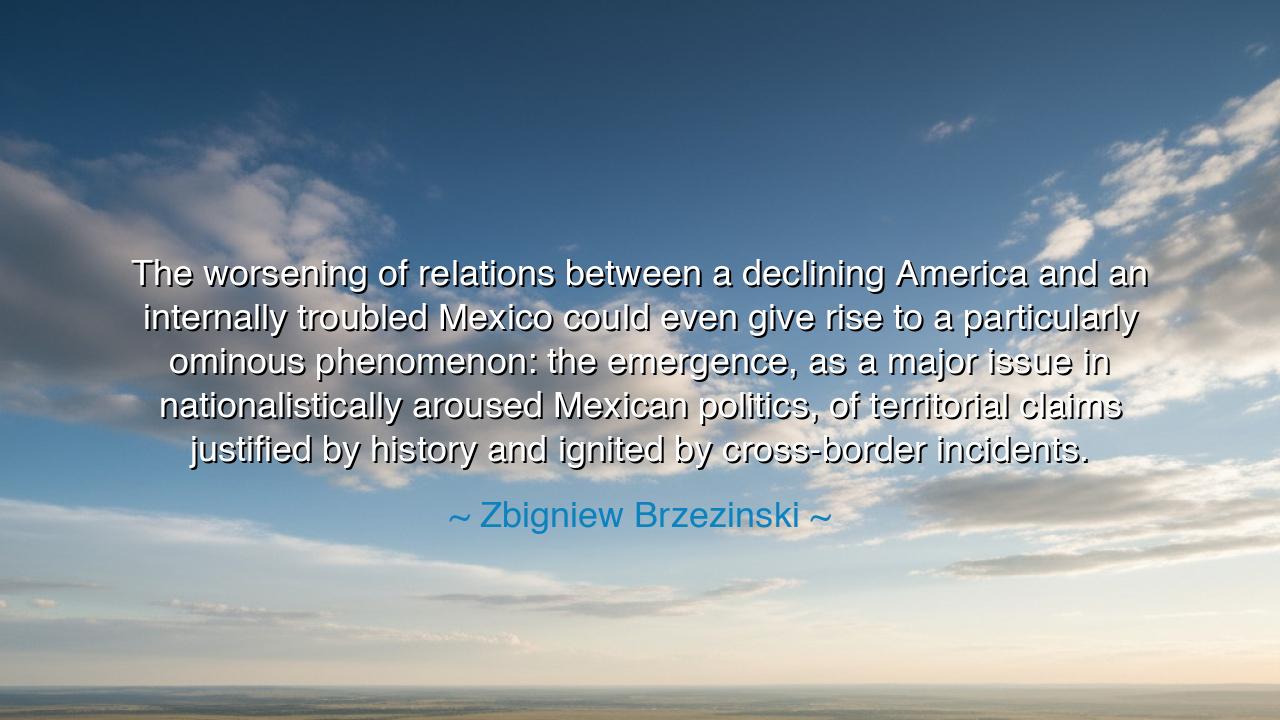
The worsening of relations between a declining America and an
The worsening of relations between a declining America and an internally troubled Mexico could even give rise to a particularly ominous phenomenon: the emergence, as a major issue in nationalistically aroused Mexican politics, of territorial claims justified by history and ignited by cross-border incidents.






In the solemn cadence of geopolitics, where nations rise and fade like tides beneath the moon, Zbigniew Brzezinski warned the world with chilling foresight: “The worsening of relations between a declining America and an internally troubled Mexico could even give rise to a particularly ominous phenomenon: the emergence, as a major issue in nationalistically aroused Mexican politics, of territorial claims justified by history and ignited by cross-border incidents.” These words are not mere speculation—they are prophecy, spoken by one who understood that history is not dead but sleeps, waiting for the sound of discord to wake it once more. In Brzezinski’s vision, he saw that when great powers grow weary and neighboring nations wrestle with turmoil, memory becomes weapon, and the ghosts of old borders return to life.
To grasp his meaning, one must first understand the nature of nations. A nation is not only its armies or its laws—it is its spirit, forged by triumph and trauma alike. When that spirit suffers humiliation, it remembers. When injustice, whether real or imagined, lingers in the collective heart, it burns like an ember beneath the ashes of peace. Brzezinski, steeped in the wisdom of history, knew that the bond between America and Mexico was as fragile as it was essential, bound by commerce yet scarred by conquest. He remembered the year 1848, when the Treaty of Guadalupe Hidalgo carved from Mexico’s body vast territories—lands that became California, Texas, Arizona, and beyond. To many, that treaty was the end of a war; to others, it was the beginning of a grievance that never died.
In times of stability, such memories sleep quietly beneath prosperity. But when nations weaken—when America declines and Mexico trembles within—those buried emotions rise again. History teaches this pattern again and again. Recall the tale of Germany after the Great War: humiliated by treaty, broken by debt, it turned its pain into nationalism, and nationalism into vengeance. What began as rhetoric became revolution, and what began as grievance became global catastrophe. Brzezinski’s warning echoes the same ancient truth—that no empire, however mighty, should ignore the silent grievances of its neighbors, nor should any nation allow pride to become the fuel of destruction.
The territorial claims justified by history that Brzezinski spoke of are not only about land—they are about identity, belonging, and the hunger of nations to reclaim what they believe is rightfully theirs. History is filled with such fires. Consider China and Taiwan, or India and Pakistan, or Russia and Ukraine. Each carries within it the same pattern: a wound of division, festering beneath the surface, waiting for the right spark. And what is the spark? It is the cross-border incident—the small flame that ignites the great inferno. Brzezinski saw that a single moment—an accident, a crime, a clash at the frontier—could awaken the dragons of nationalism on both sides of the border, unleashing chaos where once there was cooperation.
But beneath his warning lies a deeper wisdom about human nature and the destiny of nations. When he speaks of a “declining America,” he does not mock the mighty; he mourns the cycle of power itself. Every empire, from Rome to Britain, has faced its dusk. And when the great falter, the small grow restless. The world rearranges itself around weakness. Thus, Brzezinski’s words are not only a warning to America or to Mexico—they are a teaching for all civilizations: strength must be tempered by humility, and peace must be guarded by empathy. For if a nation rules without compassion, it breeds resentment; if it ignores its neighbor’s suffering, it sows the seeds of its own peril.
Consider the vision of the ancient philosophers, who taught that harmony between states must mirror harmony within the soul. A kingdom divided against itself invites ruin from without. So too with nations: when America forgets its unity, or Mexico loses faith in its future, both become prey to the old demons of nationalism and fear. Brzezinski saw that peace is not maintained by treaties alone, but by mutual understanding—by nations seeing one another not as rivals, but as reflections of shared destiny. The rivers, the trade, the migrations—all are threads of one tapestry. To tear at one corner is to unravel the whole.
Let this teaching, then, be remembered by all who live in the shadow of history: beware the pride that blinds, and the grievance that festers. The map of the world is written not only in borders, but in blood. And yet, it can be rewritten in friendship, if wisdom prevails. Let nations learn their past not to justify vengeance, but to cultivate peace. Let leaders, when they hear the drums of nationalism, silence them with understanding rather than war. For as Brzezinski knew, the true strength of a nation lies not in its armies or its wealth, but in its capacity to see beyond its own borders—to understand that in this shared age, no people can rise while their neighbor falls.
Thus, remember his words not as a prophecy of doom, but as a call to vigilance and compassion. History is alive, and it watches us. May we be the generation that learns from its warnings rather than repeats its mistakes, turning the fires of pride into the light of peace.






AAdministratorAdministrator
Welcome, honored guests. Please leave a comment, we will respond soon